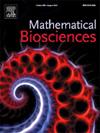The effects of tritiated water on competitive outcomes of two Daphnia species in lakes: A reaction–diffusion tritium-taxis model
IF 1.8
4区 数学
Q2 BIOLOGY
引用次数: 0
Abstract
The discharge of nuclear-contaminated water, particularly tritiated water (HTO), poses a significant global environmental challenge due to its potential negative impacts on ecosystems. To examine how such discharges influence the competitive dynamics between two Daphnia species in lake environments, we develop a spatiotemporal competition model that incorporates a tritium-taxis term. Our findings indicate that a moderate HTO input rate, combined with varying radiosensitivity between the species, can reverse the competitive outcomes between the two species. Specifically, species with lower radiosensitivity to HTO may compensate for competitive disadvantages, potentially enhancing biodiversity, or conversely, gain a competitive edge, which could reduce biodiversity. Moreover, a low HTO removal rate can lead to bistability or tristability in the system, while strong tritium-taxis promotes the development of spatially heterogeneous patterns. This study underscores the importance of considering the indirect effects of moderate HTO input and species-specific radiosensitivity, which can result in counterintuitive ecological dynamics.
氚化水对湖泊中两种水蚤竞争结果的影响:一个反应-扩散氚趋向性模型。
由于对生态系统的潜在负面影响,核污染水,特别是氚化水(HTO)的排放构成了重大的全球环境挑战。为了研究这种排放如何影响湖泊环境中两种水蚤物种之间的竞争动态,我们开发了一个包含氚趋向性术语的时空竞争模型。我们的研究结果表明,适度的HTO输入率,加上物种之间不同的辐射敏感性,可以扭转两个物种之间的竞争结果。具体而言,对HTO辐射敏感性较低的物种可能会弥补竞争劣势,从而潜在地增强生物多样性,或者相反,获得竞争优势,从而可能降低生物多样性。此外,低HTO去除率会导致系统的双稳定或三稳定,而强的氚趋向性促进了空间非均质模式的发展。这项研究强调了考虑适度HTO输入和物种特异性辐射敏感性的间接影响的重要性,这可能导致违反直觉的生态动力学。
本文章由计算机程序翻译,如有差异,请以英文原文为准。
求助全文
约1分钟内获得全文
求助全文
来源期刊

Mathematical Biosciences
生物-生物学
CiteScore
7.50
自引率
2.30%
发文量
67
审稿时长
18 days
期刊介绍:
Mathematical Biosciences publishes work providing new concepts or new understanding of biological systems using mathematical models, or methodological articles likely to find application to multiple biological systems. Papers are expected to present a major research finding of broad significance for the biological sciences, or mathematical biology. Mathematical Biosciences welcomes original research articles, letters, reviews and perspectives.
 求助内容:
求助内容: 应助结果提醒方式:
应助结果提醒方式:


